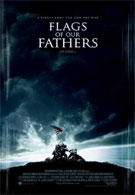I'd hate to be inside Clint Eastwood's head. The guy doesn't have a happy-go-lucky bone in his body. His movies are dire and depressing, in Clint's world everything ends in tears. The tears have never flowed more freely than they do with his latest film, Flags of our Fathers, based on a book by Jim Bradley about the true story of the men behind the famous flag-raising picture from the World War II battle of Iwo Jima.
Though the film features a spectacular yet horrifying beach-storming battle scene nearly on par with the one from Saving Private Ryan, it's not really about the heroic fight to take the tiny Japanese island where the picture is taken. Instead, the movie cuts back and forth from the battle to scenes much later after the three still living boys who raised the flag are shipped back home to be used as a promotional tool in drumming up support for the war. These boys refuse to think of themselves as heroes, they're just guys who tried not to get shot and the movie tells their story more from a perspective of sad resignation than heroic achievement in spite of the odds. There are no heroes here, simply survivors.
When in the middle of battle, because the movie is told from the extremely narrow perspective of a few soldiers in the middle of a firestorm, there's no real attempt to make sense of the specifics of what's happening at Iwo Jima. The horrific battle fought is simply a catalyst to understanding what's going on inside the heads of soldiers John "Doc" Bradley (Ryan Phillippe), Rene Gagnon (Jesse Bradford), and Ira Hayes (Adam Beach). The focus of Flags of our Fathers is not on what happened during the war, but how the war affected the men who fought in it. As you'd imagine, it isn't pretty.
When back home, the film sticks to that narrow perspective, following Rene, John, and Ira as they deal with being a propaganda figurehead while their friends die fighting in the Pacific. Each deals with their newfound notoriety differently. Rene embraces fame, John deals with it stoically, and Ira falls to pieces at the thought of being called a hero. Adam Beach delivers a heartbreakingly tortured performance as the Native American descended Ira, heroized and discriminated against for being an Indian all at once. One minute he's in a stadium being cheered by thousands, the next he's being thrown out of a bar that doesn't serve "Injuns".
The characters Paul Haggis' and William Broyles' script explores are deep, but their tale isn't. The problem with Flags of our Fathers is that the story behind the raising of that Iwo Jima flag isn't a very good one. The movie's beautiful and carefully crafted, but ultimately cynical. It ends up being more of an expose on the uses of trumped up propaganda than an exploration of the real meaning of heroism or the dark depths of war.
The propaganda angle is interesting, but the movie fails to show what a massive and bloody battle Iwo Jima was. The flag is raised just a few days in to the long, brutal fight and we never see anything else. After that gritty opening beach attack Eastwood starts stretching the rest of his meager remaining battle material out over the film as filler while he explores the public misinformation problem. What's great is that even while knee-deep in government controlled war promotion, the film keeps its emotional center by staying keyed in on those three soldiers struggle with their place in the American effort. For me that's enough to make Eastwood's latest directorial effort a good film. Ultimately though, while Flags of our Fathers raises interesting questions about heroism and the uses of propaganda it left me hungering for more about the conflict that took so many lives on the dirty, desperate ground of Iwo Jima.
Your Daily Blend of Entertainment News


